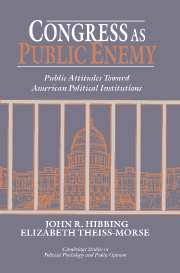Book contents
- Frontmatter
- Contents
- List of figures
- List of tables
- Preface
- CONGRESS AS PUBLIC ENEMY
- 1 Introduction: What is wrong with the American political system?
- 2 Changing levels of support for individual institutions
- 3 Perceptions of political institutions
- 4 Perceptions of congressional features and reforms
- 5 Focus groups and perceptions of the Washington system
- 6 Who approves of Congress?
- 7 Support for democratic processes
- 8 Conclusion: The people and their political system
- Appendix
- References
- Index
2 - Changing levels of support for individual institutions
Published online by Cambridge University Press: 05 August 2012
- Frontmatter
- Contents
- List of figures
- List of tables
- Preface
- CONGRESS AS PUBLIC ENEMY
- 1 Introduction: What is wrong with the American political system?
- 2 Changing levels of support for individual institutions
- 3 Perceptions of political institutions
- 4 Perceptions of congressional features and reforms
- 5 Focus groups and perceptions of the Washington system
- 6 Who approves of Congress?
- 7 Support for democratic processes
- 8 Conclusion: The people and their political system
- Appendix
- References
- Index
Summary
In Chapter I we provided an overview of explanations for public dissatisfaction with the entire political system, and a critique of the prevalent theoretical frameworks used to understand that dissatisfaction. In this chapter we offer an overview of research on public attitudes toward individual political institutions, as well as a critique of existing data available to address these attitudes. By the beginning of the third chapter, where we turn to our own data and theorizing, readers should have gained substantial familiarity with the literature and with the theoretical and evidential problems surrounding the important task of understanding the American public's feelings toward its political system and institutions.
THE NEED FOR STUDYING INDIVIDUAL INSTITUTIONS
The more global and impressionistic writings referenced in Chapter I, while useful, are beset with problems. Some problems flow from the inadequacies of the Eastonian theoretical constructs, and some flow from the fact that the evidence used to support the explanations is simply not up to the challenge. Ehrenhalt, Dionne, and the Kettering Foundation offer only anecdotal support for their views (for a withering critique of the “methodology” employed in the Kettering Report, see Polsby, 1993a); Lipset and Schneider primarily rely upon the narrow and flawed Harris question about confidence in the leaders of institutions; and Miller, Citrin, and Craig all utilize the National Election Studies battery on citizen trust and related concepts – a helpful if somewhat tired set of questions posed only once every two years.
- Type
- Chapter
- Information
- Congress as Public EnemyPublic Attitudes toward American Political Institutions, pp. 22 - 40Publisher: Cambridge University PressPrint publication year: 1995



